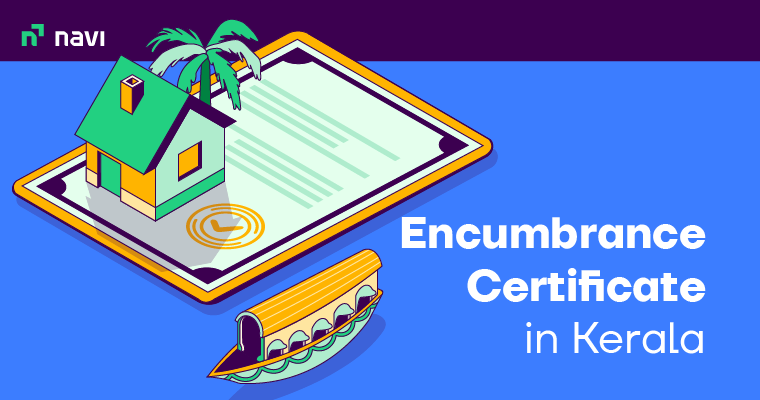Buying or selling property in Kerala requires thorough legal verification. One of the most important documents that safeguards property transactions is the Encumbrance Certificate (EC). It acts as proof of ownership and ensures that the property is free from any monetary or legal liabilities such as loans, mortgages, or legal disputes.
In Kerala, the process of obtaining an Encumbrance Certificate has been streamlined by the Kerala Registration Department online services, making it convenient for citizens to apply, check status, and download the certificate without hassles. This blog provides a detailed, systematic, and comprehensive guide on the Encumbrance Certificate in Kerala, covering every aspect including its purpose, registration, application, online process, and download steps.
What is an Encumbrance Certificate in Kerala?
An Encumbrance Certificate in Kerala is a legal document that confirms whether a property has any financial or legal liabilities attached to it. It acts as evidence of the transactions associated with the property, including sales, mortgages, and gifts. Without an EC, property transactions in Kerala are incomplete.
Key aspects:
- Issued by the Sub-Registrar’s Office (SRO) in Kerala.
- Mandatory for home loan approvals, property registration, and mutation of land records.
- Acts as a safeguard against fraudulent property deals.
Why is the Encumbrance Certificate Kerala Important?

The Encumbrance Certificate Kerala is crucial for:
- Ownership Verification – Confirms the legal owner of the property.
- Loan Sanctioning – Banks demand an EC before sanctioning a loan.
- Property Transfer – Ensures smooth and dispute-free transfer of ownership.
- Prevention of Fraud – Protects buyers from purchasing property under litigation or mortgage.
What Information Does an Encumbrance Certificate Contain?
An Encumbrance Certificate typically includes:
- Property details such as survey number, location, and boundaries.
- Transactions recorded on the property like sales, mortgages, and gifts.
- Names of current and past owners.
- Duration for which the certificate is issued.
How to Register for an Encumbrance Certificate in Kerala?
To obtain an Encumbrance Certificate in Kerala, registration is mandatory. This can be done either offline at the Sub-Registrar Office or online through the Kerala Registration Department portal.
Steps for registration:
- Visit the Sub-Registrar Office under whose jurisdiction the property falls.
- Submit an application form along with details such as property description, time period required for EC, and applicant details.
- Attach the required documents such as identity proof, property details, and address proof.
- Pay the applicable fee.
- Receive an acknowledgment slip for tracking the application.
How to Apply for Encumbrance Certificate Online in Kerala?
Thanks to digitalization, citizens can now apply for an encumbrance certificate online in Kerala through the Kerala Registration Department online portal.
Steps to apply online:
- Visit the official Kerala Registration Department online services portal. https://pearl.registration.kerala.gov.in/

- Create a user login or use your credentials if already registered.
- Select Encumbrance Certificate Application under services.

- Enter property details such as survey number, district, village, and boundaries.

- Select the time period for which you require the EC.
- Upload supporting documents.
- Pay the fee using online payment methods.
- Submit the application and note the acknowledgment number for tracking.
How to Check Encumbrance Certificate Status Online?
Tracking the encumbrance certificate status is simple through the Kerala Registration Department’s portal.
Steps for encumbrance certificate status check online:
- Go to the Kerala Registration Department online portal.
- Select the option Track Application.
- Enter your application number or acknowledgment number.
- The system will display the Kerala encumbrance certificate status online in real-time.
This helps applicants know whether the certificate has been processed, is pending, or ready for download.
How to Download Encumbrance Certificate in Kerala?
Once your application is approved, you can easily perform encumbrance certificate download Kerala through the online portal.
Steps for encumbrance certificate download:
- Log in to the Kerala Registration Department online portal.
- Navigate to the Download Certificate section.
- Enter the acknowledgment number or application ID.
- Verify the displayed details.
- Download the digitally signed encumbrance certificate in PDF format.
What are the Types of Encumbrance Certificates Issued in Kerala?
In Kerala, the Sub-Registrar’s Office issues two types of EC:
- Form 15 – Shows all registered transactions on the property during the specified period, including loans, mortgages, or transfers.
- Form 16 (Nil EC) – Certifies that no transactions were recorded for the given period.
Documents Required for Encumbrance Certificate in Kerala

Applicants must submit the following documents:
- Application form (online or offline).
- Property details (survey number, boundaries, location).
- Identity proof (Aadhaar, Voter ID, or Passport).
- Address proof.
- Property deed copy (if available).
How Long Does it Take to Get an Encumbrance Certificate in Kerala?
The processing time varies based on application mode:
- Offline Application: 10 to 15 working days.
- Online Application: 5 to 7 working days (faster if all documents are accurate).
What is the Validity of an Encumbrance Certificate in Kerala?
An Encumbrance Certificate in Kerala is valid until a new transaction is recorded on the property. Hence, its validity is not fixed but depends on future transactions.
What are the Fees for Encumbrance Certificate in Kerala?
The cost of obtaining an EC depends on:
- Duration of the certificate (e.g., 10 years, 30 years).
- Mode of application (online/offline).
Typically, fees range between Rs. 200 and Rs. 600 in Kerala.
Benefits of Applying for Encumbrance Certificate Online

- Time-Saving – Avoids long queues at Sub-Registrar’s Offices.
- Transparency – Online tracking provides real-time status.
- Accessibility – Certificates can be downloaded anytime.
- Efficiency – Digital records reduce human errors.
Common Issues Faced While Applying for EC in Kerala

- Incorrect property details leading to rejection.
- Delays in verification due to mismatched documents.
- Technical issues on the Kerala Registration Department portal.
- Miscommunication with Sub-Registrar’s Office during offline applications.
Conclusion
The Encumbrance Certificate Kerala is a cornerstone of property transactions. Whether you are applying for a home loan, transferring ownership, or simply verifying the legal standing of your property, the EC is indispensable. With the convenience of encumbrance certificate online application, status tracking, and download, the Kerala government has simplified the process significantly.
At Housiey, we believe in empowering property buyers with accurate knowledge that ensures safe and secure investments. If you’re planning to invest in Kerala’s real estate, securing an Encumbrance Certificate should be your first step.
For more insights into Kerala’s property ecosystem, don’t miss our detailed blog on “Kerala Town Planning Scheme.”
FAQs
Buying or selling property in Kerala requires thorough legal verification. One of the most important documents that safeguards property transactions is the Encumbrance Certificate (EC). It acts as proof of ownership and ensures that the property is free from any monetary or legal liabilities such as loans, mortgages, or legal disputes.
In Kerala, the process of obtaining an Encumbrance Certificate has been streamlined by the Kerala Registration Department online services, making it convenient for citizens to apply, check status, and download the certificate without hassles. This blog provides a detailed, systematic, and comprehensive guide on the Encumbrance Certificate in Kerala, covering every aspect including its purpose, registration, application, online process, and download steps.
What is an Encumbrance Certificate in Kerala?
An Encumbrance Certificate in Kerala is a legal document that confirms whether a property has any financial or legal liabilities attached to it. It acts as evidence of the transactions associated with the property, including sales, mortgages, and gifts. Without an EC, property transactions in Kerala are incomplete.
Key aspects:
- Issued by the Sub-Registrar’s Office (SRO) in Kerala.
- Mandatory for home loan approvals, property registration, and mutation of land records.
- Acts as a safeguard against fraudulent property deals.
Why is the Encumbrance Certificate Kerala Important?

The Encumbrance Certificate Kerala is crucial for:
- Ownership Verification – Confirms the legal owner of the property.
- Loan Sanctioning – Banks demand an EC before sanctioning a loan.
- Property Transfer – Ensures smooth and dispute-free transfer of ownership.
- Prevention of Fraud – Protects buyers from purchasing property under litigation or mortgage.
What Information Does an Encumbrance Certificate Contain?
An Encumbrance Certificate typically includes:
- Property details such as survey number, location, and boundaries.
- Transactions recorded on the property like sales, mortgages, and gifts.
- Names of current and past owners.
- Duration for which the certificate is issued.
How to Register for an Encumbrance Certificate in Kerala?
To obtain an Encumbrance Certificate in Kerala, registration is mandatory. This can be done either offline at the Sub-Registrar Office or online through the Kerala Registration Department portal.
Steps for registration:
- Visit the Sub-Registrar Office under whose jurisdiction the property falls.
- Submit an application form along with details such as property description, time period required for EC, and applicant details.
- Attach the required documents such as identity proof, property details, and address proof.
- Pay the applicable fee.
- Receive an acknowledgment slip for tracking the application.
How to Apply for Encumbrance Certificate Online in Kerala?
Thanks to digitalization, citizens can now apply for an encumbrance certificate online in Kerala through the Kerala Registration Department online portal.
Steps to apply online:
- Visit the official Kerala Registration Department online services portal. https://pearl.registration.kerala.gov.in/

- Create a user login or use your credentials if already registered.
- Select Encumbrance Certificate Application under services.

- Enter property details such as survey number, district, village, and boundaries.

- Select the time period for which you require the EC.
- Upload supporting documents.
- Pay the fee using online payment methods.
- Submit the application and note the acknowledgment number for tracking.
How to Check Encumbrance Certificate Status Online?
Tracking the encumbrance certificate status is simple through the Kerala Registration Department’s portal.
Steps for encumbrance certificate status check online:
- Go to the Kerala Registration Department online portal.
- Select the option Track Application.
- Enter your application number or acknowledgment number.
- The system will display the Kerala encumbrance certificate status online in real-time.
This helps applicants know whether the certificate has been processed, is pending, or ready for download.
How to Download Encumbrance Certificate in Kerala?
Once your application is approved, you can easily perform encumbrance certificate download Kerala through the online portal.
Steps for encumbrance certificate download:
- Log in to the Kerala Registration Department online portal.
- Navigate to the Download Certificate section.
- Enter the acknowledgment number or application ID.
- Verify the displayed details.
- Download the digitally signed encumbrance certificate in PDF format.
What are the Types of Encumbrance Certificates Issued in Kerala?
In Kerala, the Sub-Registrar’s Office issues two types of EC:
- Form 15 – Shows all registered transactions on the property during the specified period, including loans, mortgages, or transfers.
- Form 16 (Nil EC) – Certifies that no transactions were recorded for the given period.
Documents Required for Encumbrance Certificate in Kerala

Applicants must submit the following documents:
- Application form (online or offline).
- Property details (survey number, boundaries, location).
- Identity proof (Aadhaar, Voter ID, or Passport).
- Address proof.
- Property deed copy (if available).
How Long Does it Take to Get an Encumbrance Certificate in Kerala?
The processing time varies based on application mode:
- Offline Application: 10 to 15 working days.
- Online Application: 5 to 7 working days (faster if all documents are accurate).
What is the Validity of an Encumbrance Certificate in Kerala?
An Encumbrance Certificate in Kerala is valid until a new transaction is recorded on the property. Hence, its validity is not fixed but depends on future transactions.
What are the Fees for Encumbrance Certificate in Kerala?
The cost of obtaining an EC depends on:
- Duration of the certificate (e.g., 10 years, 30 years).
- Mode of application (online/offline).
Typically, fees range between Rs. 200 and Rs. 600 in Kerala.
Benefits of Applying for Encumbrance Certificate Online

- Time-Saving – Avoids long queues at Sub-Registrar’s Offices.
- Transparency – Online tracking provides real-time status.
- Accessibility – Certificates can be downloaded anytime.
- Efficiency – Digital records reduce human errors.
Common Issues Faced While Applying for EC in Kerala

- Incorrect property details leading to rejection.
- Delays in verification due to mismatched documents.
- Technical issues on the Kerala Registration Department portal.
- Miscommunication with Sub-Registrar’s Office during offline applications.
Conclusion
The Encumbrance Certificate Kerala is a cornerstone of property transactions. Whether you are applying for a home loan, transferring ownership, or simply verifying the legal standing of your property, the EC is indispensable. With the convenience of encumbrance certificate online application, status tracking, and download, the Kerala government has simplified the process significantly.
At Housiey, we believe in empowering property buyers with accurate knowledge that ensures safe and secure investments. If you’re planning to invest in Kerala’s real estate, securing an Encumbrance Certificate should be your first step.
For more insights into Kerala’s property ecosystem, don’t miss our detailed blog on “Kerala Town Planning Scheme.”
FAQs














